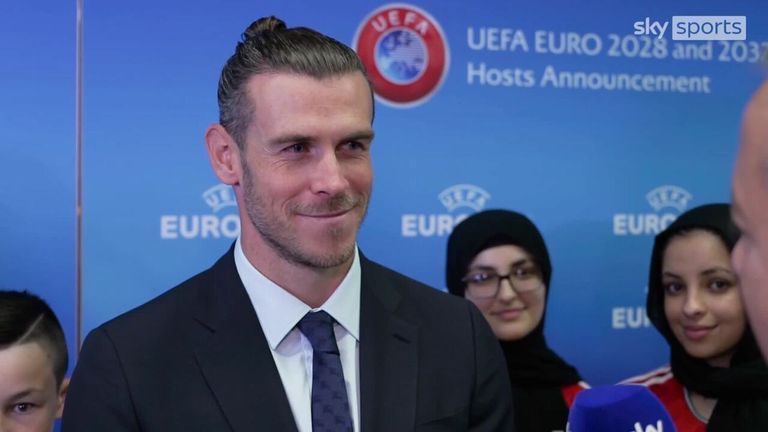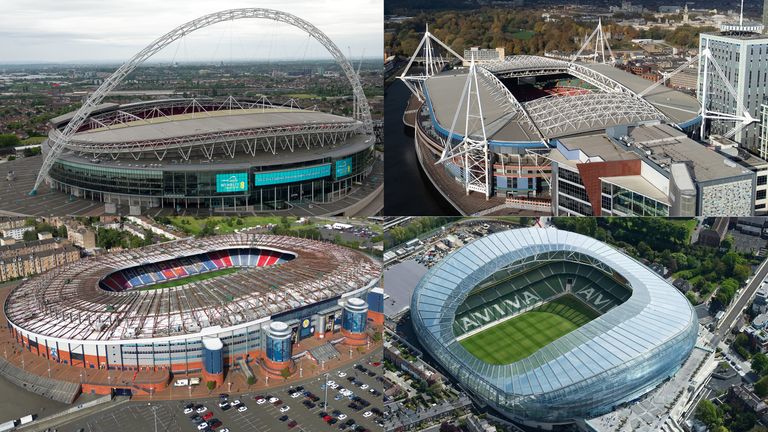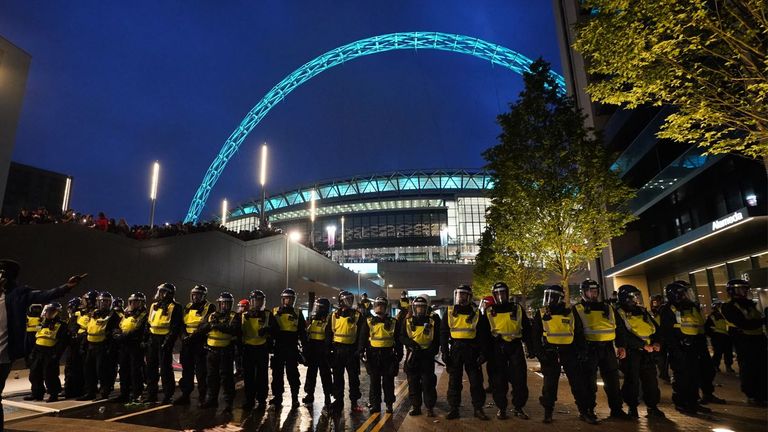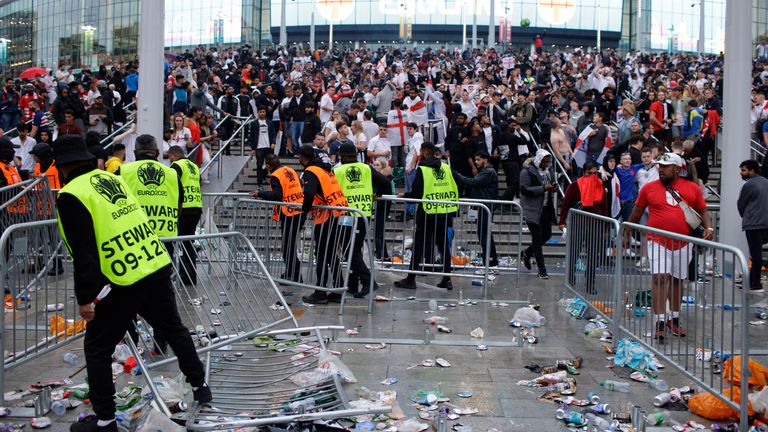England, Scotland, Wales and the Republic of Ireland will not be handed automatic qualification for Euro 2028 despite hosting the tournament.
However, the host nations may be able to take advantage of a safety net should they not book a place at the finals at the first time of asking.
UEFA’s executive committee has announced all four nations will take part in the qualifying phase but there will be two spots for the best-ranked hosts who do not qualify for the tournament.
So if at least two of England, Scotland, Wales and the Republic of Ireland qualify, then all four nations will appear in the tournament.
The UK and Ireland will host Euro 2028, while Turkey and Italy were awarded the 2032 tournament.
The UEFA executive committee gave the green light to an initial five-nation bid, which ran unopposed after Turkey withdrew to focus on its joint bid with Italy for 2032.
Ten stadia were included in the UK-Ireland bid submission in April. Six of the venues were in England, with one each from Northern Ireland, the Republic of Ireland, Scotland and Wales.
However, Northern Ireland will not be a host nation after plans to redevelop Casement Park in time for the finals were halted in September 2024. This means they will miss out on an automatic qualification spot should they fail to qualify through the group stage.
The tournament will be held in June and July of 2028 – exactly seven years since England and Scotland both hosted games during the rearranged Euro 2020, which was held across Europe.
FA chief executive Mark Bullingham told Sky Sports: “We’re delighted. It’s been three years of hard work to get to this point. It’s fantastic for us and the country, the home nations and Ireland. We’re really looking forward to it.
“We worked really hard to put together a really strong bid and we think that’s probably the reason we were unopposed in the end.”
UEFA is projecting that it will make more money from Euro 2028 than any other major tournament, including Euro 2032.
How will host nations qualify?
All four countries will go through qualification, with two automatic places set aside for the best-ranked host nations who do not qualify on the pitch.
The FA wanted England to stay competitive by playing in qualifiers, avoiding two years of friendlies instead.
“From our point of view, it’s great to be taking part in qualifying and we want to get everyone there,” Bullingham told Sky Sports.
“It is better to play in a tournament where it matters and we have competitive games. We’re looking forward to that.
“It’s always been part of our discussions with the other countries and UEFA that we would take part in qualifying. We think, with the new format of European football, that’s the right thing to do.”
Depending on the number of spots used by the host nations, the number of final tournament spots decided by play-offs may vary between two and four, in one of the three following scenarios:
Both reserved qualifying slots for the hosts used: Eight teams compete in two paths for two final tournament spots, with single-leg semi-finals and finals.
One reserved qualifying slot for the hosts used: 12 teams compete in three paths for three final tournament spots, with single-leg semi-finals and finals.
No reserved qualifying slot for the hosts used: Eight teams contest four home-and-away play-off ties, with the winners advancing to the final tournament.
The tournament schedule is expected to be released in autumn 2025. The tournament regulations with all remaining details will be published by the end of the year.
Where will the games be played?
The six venues in England are Wembley, the Tottenham Hotspur Stadium, the Etihad Stadium, St James’ Park, Villa Park and Everton’s new Hill Dickinson Stadium.
The Aviva Stadium in Dublin, Hampden Park in Glasgow and the Principality Stadium in Cardiff were the other stadia included in the submission.
There are going to be 24 teams involved, with 51 games played during the tournament.
The opening game is expected to be played in Cardiff, with the semi-finals and final played at Wembley.
The quarter-finals will take place at Wembley, Wales, Scotland and Ireland.
What happened to Casement Park?
Northern Ireland are no longer a host nation of Euro 2028 after the UK government announced in September 2024 that it would not be providing funding to redevelop Casement Park in time for the tournament, adding there was a “significant risk” it would not be built in time.
The government said the estimated cost of rebuilding the stadium in Belfast had “risen dramatically” to more than £400m.
The site is derelict and plans by the Gaelic Athletic Association to redevelop it with a 34,000 capacity stadium have been mired in controversy and hit by delays.
Are there concerns over Wembley hosting the final?
Sky Sports News chief reporter Kaveh Solhekol:
“The UEFA executive committee has had assurances from the FA that there won’t be a repeat of the disgraceful scenes that we saw at Wembley for the Euro 2020 final.
“Anyone who was there that day will remember what a shocking experience it was. There was very little security so many people seemed to gain access to the stadium without tickets. An official report found that it was basically a miracle that nobody lost their lives.
“The FA say they have learned lessons and nothing like that is going to happen again. UEFA have confidence in the FA.
“It’s not just the FA who have questions to answer because everyone saw what happened at the last two Champions League finals in Paris and Istanbul.
“I was at both and a lot of the supporters, especially from Liverpool and Manchester City, said they have absolutely no faith in UEFA any longer and would not want to go to any major games organised by them.
“There are not just questions for the FA to answer but also serious questions for UEFA and their executive committee to answer about whether they are fit for purpose when it comes to hosting major tournaments and finals.”
‘UEFA confident we can deliver brilliant Euros’
Over concerns about Wembley hosting the Euro 2028 final after the issues at the previous tournament, Bullingham told Sky Sports: “That was obviously something we talked about when Baroness Casey did her review and we covered everything at that point.
“UEFA were very comfortable at that point and it hasn’t been a big issue with them since. They know we’ve spent a lot of money upgrading the stadium. They’re really confident we can deliver a brilliant Euros and that’s what we’ll do.
“We’re really proud of our stadium and it’s a brilliant place to hold major events, and we’re delighted UEFA see it that way as well.”








